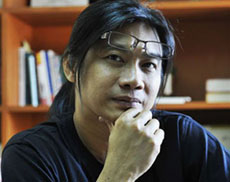Exactly 26 years ago, shortly after the Burma Army had seized power through a coup d’état, I met up with friends in the safety of a shuttered tea shop in downtown Rangoon. As we spoke, I could see convoys of soldiers drive through the streets, passing by the bodies of unarmed protesters who still lay there after having been shot earlier that day or the night before.
Outside, a shot was fired at a young man who was brave enough to defy the soldiers and raise his fist. In the shop, we quickly ducked to the ground.
The generals who seized power that day stayed on through more than two decades of repression. They are the same people who carefully planned to open up Burma in a managed transition to nominally civilian rule, after first ensuring themselves a role in the new government by rigging the 2010 elections.
When I first went back to the country in 2012, after having left in late 1988, I quickly noticed that Burma’s celebrated transition had left the same military and political elite in control of politics, economy and wealth. Former and active generals still run the show, and continue to dictate how the Burmese public, opposition, activists and media should behave.
We don’t need international political analysts, the UN and other big donor institutions to produce piles of assessments and country reports to analyze the intentions of this government—for many of the military’s long-time critics it has already become clear.
Though President Thein Sein said in his speeches that he welcomes Burmese exiles back to develop our impoverished country, we have experienced that the reality is different and his message lacks sincerity.

Even to enter Burma is becoming difficult again these days, with exiles, activists and journalists struggling to obtain visas, while those who are critical of the current government are at risk of being deported or barred from entry.
On the one hand, exiles who signaled that they are willing to relinquish politics, critical journalism and activism can be invited to cooperate with the government, especially through business deals or apolitical development projects that bring in donor funding.
But those who want to continue to highlight government wrongdoings, fight against rights abuses and push for political change will find a government that has no intention of welcoming them.
Despite the lifting of junta-style, draconian media controls in recent years, us exiled journalists, who decided to bring back skills, experience and news organizations to our own country, have found it difficult because we continue critical reporting.
The Ministry of Information, under control of the recently-appointed Minister Ye Htut, is filled with ex-army officers seeking to curb independent journalism and to spread the government’s message through state-controlled media, much as it did under the previous military regime.
With abundant government resources, the ministry now plans to transform state-run newspapers, radio and television—the regime’s old propaganda outlets—into more modern-sounding “public service media”, probably with the aim of drowning out and undercutting the market for independent media.
It seems unlikely that public service radio and television will become sufficiently independent from the government, and Ye Htut has indicated that Burma will become one of the few countries in the world that will continue to have state-owned daily newspapers.
“We will create public service [print] media because most of our public gets information from print media—our digital penetration rate is low. We will make it successful,” Ye Htut told the 3rd Conference on Media Development in Myanmar, in Rangoon on Thursday.
However, it is important for activists, journalists and former exiles in Burma to remember the past decades of repression and remain critical of this government and “not drink the Kool-Aid”.
The late journalist and pro-democracy activists Win Tin told everyone, “I don’t trust this government.” Indeed, it is not our job as journalists to trust the government, and certainly not one filled with former military men who have yet to apologize for crushing democracy 26 years ago.
















